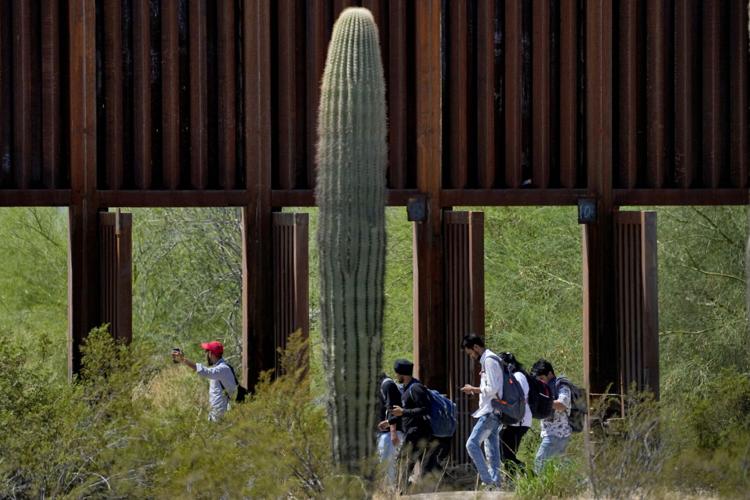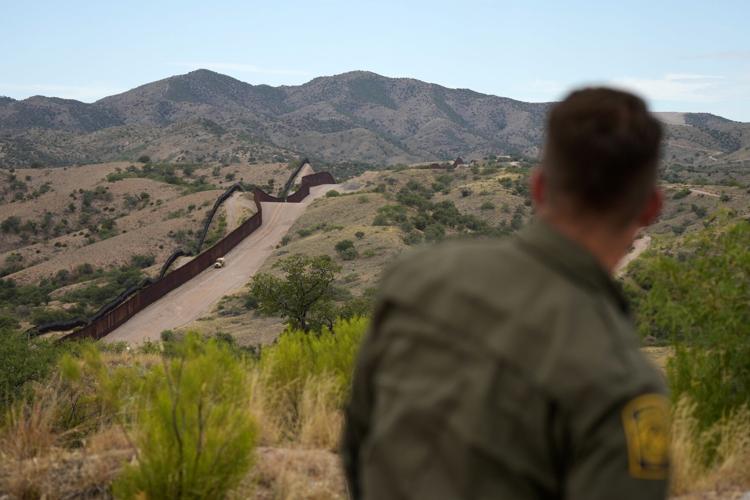Voters in Arizona, whose border with Mexico is on the front lines of dealing with illegal immigration, approved new state laws aimed at stemming the flow.
Vote tallies show almost 63% of ballots cast in Tuesday’s election favored Proposition 314 to enact those laws.
Passage occurred without organized campaign support. But the measure, put on the ballot by Republican state lawmakers, could have benefited from years of headlines and videos about people entering the country illegally.
The number of border crossers has recently slowed. But the issue was a central point in the presidential race, with Republican Donald Trump promising mass deportations once he takes office, and Democrats conceding that more needs to be done though their approaches are different.
GOP lawmakers titled Prop. 314 as designed to respond to “harms related to an unsecured border.’’
How many undocumented individuals are in this country is unclear. The most recent figure from the Center for Migration Studies was 11.7 million in July 2023. For Arizona, the data goes back to 2022 with an estimate of 290,000 from the Department of Homeland Security.
Prop. 314 has four provisions.
One makes it a crime to use false documents when applying for work. Another mandates proof of legal presence to obtain certain public benefits.
Another section increases the penalty for the “sale of lethal fentanyl,’’ based on the claim that much of the supply of the drug or its precursor chemicals came across the border.
The key provision allows state and local police to arrest anyone they suspect is not a legal resident who enters Arizona from Mexico at other than a lawful port of entry.
That has led to claims the law will lead to racial profiling.
In a bid to address that, state Sen. Ken Bennett, R-Prescott, insisted on addition of a provision saying an arrest cannot take place unless the law enforcement officer “witnesses the violation’’ or has a recording of the illegal crossing.
That did not mollify foes, who noted there also is a catch-all of sorts allowing an arrest if there is “any other constitutionally sufficient indicia of probable cause.’’
During House debate on the measure, Rep. Patty Contreras, D-Phoenix, who was born in Yuma, said there is a history of racial profiling in Arizona.
She told colleagues of being taken with her seven siblings on road trips by her parents. On one of those trips, Contreras said, her father, John, was stopped by police in Quartzsite, about 100 miles north of the border.
“He was an American citizen, he was born in California, he was a Korean War veteran,’’ she said. He also was a businessman and a former vice mayor of Somerton where they were living, and an American Legion post commander.
“But these things didn’t matter to the officer,’’ Contreras continued. “What mattered to the officer was that there was a brown-skinned man driving a station wagon filled with a bunch of little brown kids.’’
The measure provides immunity to government entities, officials, employees and contractors for any actions taken under the law.
House Minority Whip Teresa Martinez, a Casa Grande Republican, in voting to send the measure to the ballot, said, “This vote will allow the people of Arizona to decide for themselves what they want. Do they want a stronger border? Or do they want open borders?’’
There have been various estimates of what the new law might cost in law enforcement and incarceration. That has been countered by claims about the cost of illegal immigration.
Prop. 134 is set up so that judges, rather than jailing individuals, can order them to “return to the foreign nation from which the person entered’’ or to the “nation of origin.’’ Judges would be able to order a state or local law enforcement agency to transport them to a port of entry.
None of this, however, is going to happen soon — if at all.
The key provision is modeled after SB 4, approved by the Texas Legislature but challenged by the U.S. Justice Department, which argues it interferes with the exclusive right of the federal government to regulate immigration. A federal appellate court has blocked enforcement until that litigation is settled.
The questionable legality did not escape Arizona lawmakers.
Prop. 134 is worded that it cannot be enacted here until at least 60 days after there is a final ruling on whether Texas can enforce its law. And it could take months for that Texas case to get resolved.
Democratic Gov. Katie Hobbs vetoed legislation with a nearly identical provision earlier this year. That led to the decision by GOP lawmakers — there were no Democratic votes — to bypass the governor and send it directly to voters.
Republican presidential candidate Donald J. Trump visited to a remote area of Arizona's southern border on Thursday, about 20 miles west of the Naco port of entry, at the same location where Trump's vice presidential candidate JD Vance made a media appearance on Aug. 1.
Vice President Kamala Harris visits the US-Mexico border in Arizona, Friday Sept. 27th





